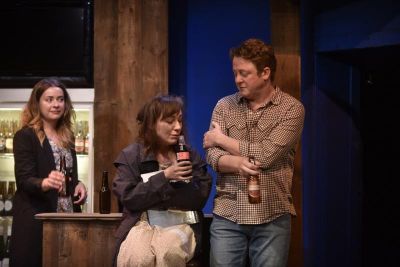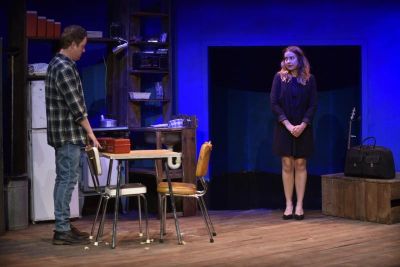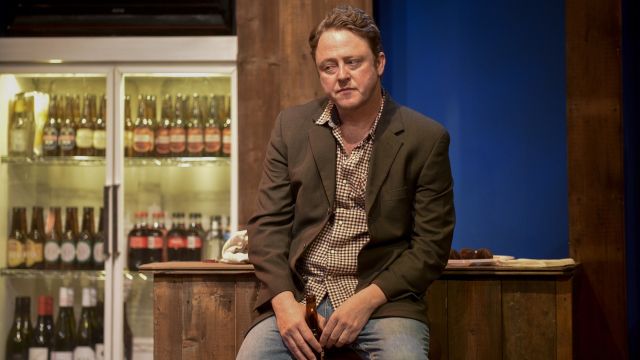Lamb
In so many rural family stories, there are those who leave and those who stay; there is the one who got away, but who can never really break free and is drawn back to what is irrevocably in their blood. There are those who had no choice. And there are those who stay or have stayed, out of duty or cowardice or obligation, and who feel put-upon and abandoned, and resent it bitterly.
Jane Bodie’s play is insightful and moving, her depiction of her characters sharpened by their sadness, anger and love. Mark Seymour’s songs are a nice fit: as if credibly written by the characters and in keeping with the play’s themes - laments for a lost past or pleas to stay together. Set on a sheep station about to be hit by a drought and the district’s one-pub town, Lamb presents a story with a complex past.
Ms Bodie has done her research – including into the hard and never-ending toil of being a farmer. Annie (Bridget Gallacher) is the one who got away – from a violent father and a cold, rejecting mother - and built something of a career for herself as a country & western singer in the city. Her sister Kathleen (Emily Goddard) wasn’t going anywhere: she has a mental disability. So, the burden falls on Patrick (Simon Maiden): he’s still there with a thwarted career as a singer-songwriter himself, a short fuse temper and a heavy chip on his shoulder – but he’s in charge, done things Dad would not have liked, made some changes and has the place ‘ticking over’. But now it’s lambing season and Annie’s come back – unexpectedly - for Mum’s funeral and she and Patrick have to communicate across a chasm… Their sister Kathleen could be a constant, but she too is changing, growing in ways her siblings don’t expect – and the way Ms Goddard plays her, with a nice feel for comedy and timing, she becomes a far from incidental character. Her sharp reactions show her as not as simple or muddled as she might appear – and the humour is familiar to us from Ms Bodie’s work in the past.
 Here Ms Bodie takes what could be a straightforward enough situation and plays it backward – or, more exactly, with a circular structure – beginning with Annie leaving (again) after the funeral and then going back in time. Thus we are intrigued, and information comes out as ironic revelation after the fact.
Here Ms Bodie takes what could be a straightforward enough situation and plays it backward – or, more exactly, with a circular structure – beginning with Annie leaving (again) after the funeral and then going back in time. Thus we are intrigued, and information comes out as ironic revelation after the fact.
Another and even more adventurous innovation is to show us Patrick, Kathleen and Annie’s parents, Mary and Frank, and have them played also by Ms Gallacher and Mr Maiden. Whether this quite comes off is debateable, but again the irony is clear, and their scenes are scenes of real interaction rather than exposition about the past – which rather dominate the scenes in the ‘present’. (There is perhaps rather too much of characters reminiscing and ‘reminding’ each other what happened ‘back then’.)
These scenes in the past give Ms Gallacher the opportunity to play a confident, optimistic, left-leaning young woman and Mr Maiden to be a clumsily charming young fellow and burgeoning songwriter. In the present, Ms Gallacher’s Annie, by contrast, is the complex product of her past: city-brisk, exasperated, apologetic, wounded, lonely, longing for the family she never had, her self-confidence a front – and Ms Gallacher delivers all this beautifully. Mr Maiden’s Patrick for no fault of his own does perhaps get trapped in a one-note persona – angry, jealous, self-punishing – and his scenes with Annie can feel a touch repetitious as a result.
 Director Julian Meyrick has concentrated on performance and they are detailed and convincing. But with a director of his experience and two dramaturgs – Ian Sinclair and Ella Caldwell – one might have expected these minor infelicities to have been worked out. To be blunt, the play is longer than it needs to be.
Director Julian Meyrick has concentrated on performance and they are detailed and convincing. But with a director of his experience and two dramaturgs – Ian Sinclair and Ella Caldwell – one might have expected these minor infelicities to have been worked out. To be blunt, the play is longer than it needs to be.
Greg Clarke provides a set that is both the only pub in town (in the past the fridge has solid doors and in the present is a glass fronted display case) and the homestead kitchen, which never changes. In the distance, the horizon glitters and a night sky is lit by stars. Justin Gardam’s sound design includes the familiar, comforting Australian sound of rain on a corrugated iron roof.
Despite the non-linear telling of its story and the ‘flashback’ scenes of Mary and Frank’s romance (if that’s the word), Lamb is a straightforward naturalistic family drama imbued with real and ambivalent emotions experienced by believable and comprehensible characters. They are all, in their way, trapped by their limitations, an escape from which comes with the realisation that things are not immutable, and that change is possible. Ironically, it is Kathleen who is already on her way out – and by her own volition. If the resolution comes just a little too easily, we go along with it because we really want these characters to be a family, perhaps for the first time.
Michael Brindley
Photographer: Jodie Hutchinson
Subscribe to our E-Newsletter, buy our latest print edition or find a Performing Arts book at Book Nook.

